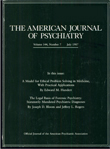The psychosocial impact of war trauma and torture on Southeast Asian refugees
Abstract
More than 700,000 refugees from Southeast Asia have settled in the United States since 1975. Although many have suffered serious trauma, including torture, few clinical reports have described their trauma- related symptoms and psychosocial problems. The authors conducted a treatment study of 52 patients in a clinic for Indochinese. They found that these patients were a highly traumatized group; each had experienced a mean of 10 traumatic events and two torture experiences. Many of the patients had concurrent diagnoses of major affective disorder and posttraumatic stress disorder as well as medical and social disabilities associated with their history of trauma. The authors also found that Cambodian women without spouses demonstrated more serious psychiatric and social impairments than all other Indochinese patient groups.
Access content
To read the fulltext, please use one of the options below to sign in or purchase access.- Personal login
- Institutional Login
- Sign in via OpenAthens
- Register for access
-
Please login/register if you wish to pair your device and check access availability.
Not a subscriber?
PsychiatryOnline subscription options offer access to the DSM-5 library, books, journals, CME, and patient resources. This all-in-one virtual library provides psychiatrists and mental health professionals with key resources for diagnosis, treatment, research, and professional development.
Need more help? PsychiatryOnline Customer Service may be reached by emailing [email protected] or by calling 800-368-5777 (in the U.S.) or 703-907-7322 (outside the U.S.).



